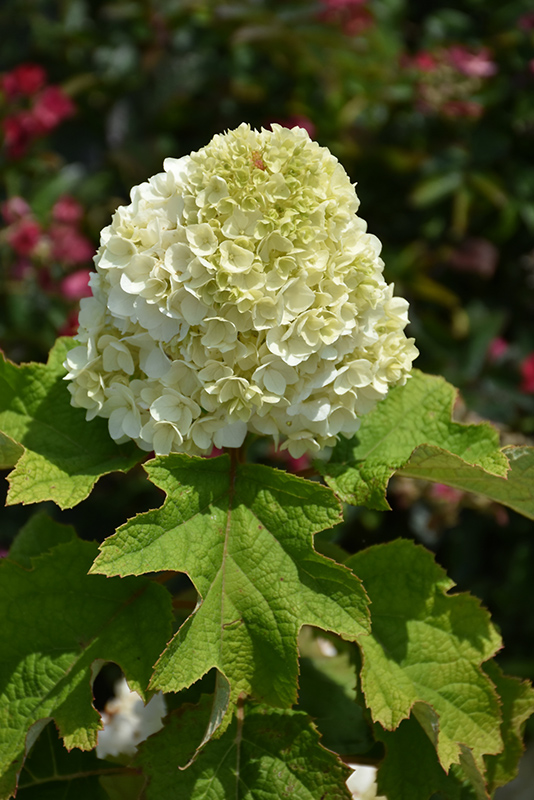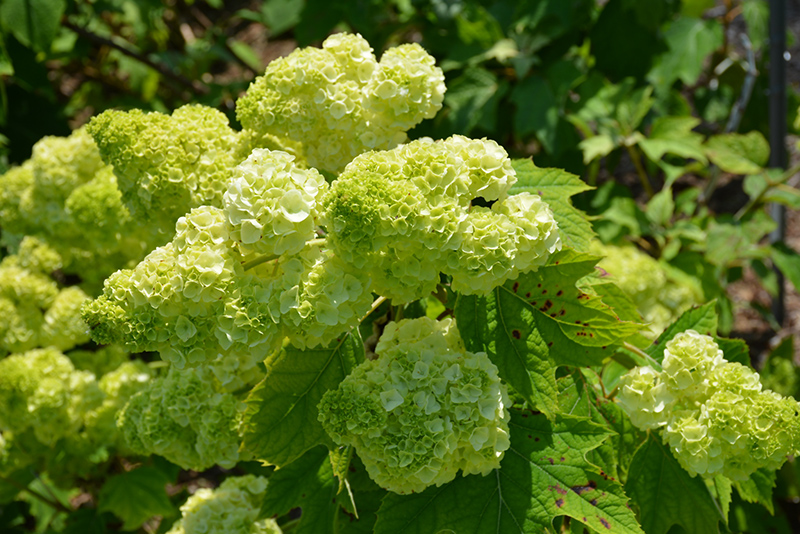Search Our Plants
Gatsby Moon® Hydrangea
Hydrangea quercifolia 'Brother Edward'
Height: 8 feet
Spread: 8 feet
Sunlight:
![]()
![]()
Hardiness Zone: 5
Other Names: Oak Leaf Hydrangea
Group/Class: Gatsby Series
Brand: Proven Winners
Description:
A distinctive, showy oakleaf hydrangea featuring impressively large, full panicles of white double flowers that mature to green; wine red fall foliage color; blooms on old wood; a great selection for gardens and borders
Ornamental Features
Gatsby Moon® Hydrangea features bold conical double white flowers at the ends of the branches from early to late summer. The flowers are excellent for cutting. It has attractive green deciduous foliage. The lobed leaves are highly ornamental and turn an outstanding dark red in the fall. The peeling brick red bark adds an interesting dimension to the landscape.
Landscape Attributes
Gatsby Moon® Hydrangea is a multi-stemmed deciduous shrub with an upright spreading habit of growth. Its relatively coarse texture can be used to stand it apart from other landscape plants with finer foliage.
This is a relatively low maintenance shrub, and is best pruned in late winter once the threat of extreme cold has passed. It has no significant negative characteristics.
Gatsby Moon® Hydrangea is recommended for the following landscape applications;
- Mass Planting
- General Garden Use
- Container Planting
Planting & Growing
Gatsby Moon® Hydrangea will grow to be about 8 feet tall at maturity, with a spread of 8 feet. It tends to fill out right to the ground and therefore doesn't necessarily require facer plants in front, and is suitable for planting under power lines. It grows at a slow rate, and under ideal conditions can be expected to live for approximately 30 years.
This shrub does best in full sun to partial shade. It prefers to grow in average to moist conditions, and shouldn't be allowed to dry out. It is not particular as to soil type or pH. It is somewhat tolerant of urban pollution, and will benefit from being planted in a relatively sheltered location. Consider applying a thick mulch around the root zone in winter to protect it in exposed locations or colder microclimates. This is a selection of a native North American species.
Gatsby Moon® Hydrangea makes a fine choice for the outdoor landscape, but it is also well-suited for use in outdoor pots and containers. With its upright habit of growth, it is best suited for use as a 'thriller' in the 'spiller-thriller-filler' container combination; plant it near the center of the pot, surrounded by smaller plants and those that spill over the edges. It is even sizeable enough that it can be grown alone in a suitable container. Note that when grown in a container, it may not perform exactly as indicated on the tag - this is to be expected. Also note that when growing plants in outdoor containers and baskets, they may require more frequent waterings than they would in the yard or garden.
This Plant Finder tool is an online catalog representing many of the varieties that we carry over the course of the season, and is intended for informational purposes only. Inventory varies seasonally, so we cannot guarantee that every plant will be in stock at all times - please contact your nearest Platt Hill Nursery store for current availability. It does not include our entire inventory of plants, so be sure to visit us to see varieties that may not be represented on this list.


